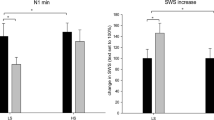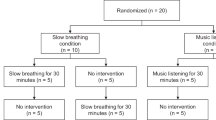Abstract
The effects of the preference for excitative music on sleep inertia after a daytime nap were examined. Sixteen young healthy adults took a 20-min nap at 14:00 after which half were exposed to excitative high- or low-preference music and half were not. Musical stimuli were applied for 20 min after napping, and the subjects rated their sleepiness and comfort by themselves and performed a selective reaction time task. The results showed that subjective sleepiness was reduced under both music conditions immediately after awakening. However, sleepiness was further reduced and results of successive performance improved when the participants were exposed to high-preference music. Subjective comfort also improved under the high-preference condition. These results suggest that excitative music, regardless of preference for the type, exhibits positive effects on sleep inertia, and that higher preference music further stimulates the daytime arousal level.
Similar content being viewed by others
References
Garbarino S, Nobili L, Beelke M, Phy FDC, Fernllo F. The contributing role of sleepiness in highway vehicle accidents. Sleep 2001; 24: 203–6.
Hayashi M, Morikawa T, Hori T. Circasemidian 12-hour cycle of slow wave sleep under constant darkness. Clin. Neurophysiol. 2002; 113: 1505–16.
Takahashi M. The role of prescribed napping in sleep medicine. Sleep Med. Rev. 2003; 7: 227–35.
Hayashi M, Ito S, Hori T. The effects of a 20-min nap at noon on sleepiness, performance and FFG activity. Int. J. Psychophysiol. 1999a; 32: 173–80.
Hayashi M, Watanabe M, Hori T. The effects of a 20-min nap in the mid-afternoon on mood, performance and FFG activity. Clin. Neurophysiol. 1999b; 110: 272–9.
Hayashi M, Fukushima H, Hori T. The effects of short daytime naps for five consecutive days. Sleep Res. Online 2003a; 5: 13–7.
Hayashi M, Masuda A, Hori T. The alerting effects of caffeine, bright light and face washing after a short daytime nap. Clin. Neurophysiol. 2003b; 114: 2268–78.
Muzet A, Nicolas A, Tassi P, Dewasmes G, Bonneau A. Implementation of napping in industry and the problem of sleep inertia. J. Sleep Res. 1995; 4: 67–9.
Ferrara M, Gennaro L. The sleep inertia phenomenon during the sleep-wake transition: theoretical and operational issues. Aviat Space Environ Med. 2000; 71: 843–8.
Tassi P, Muzet A. Sleep inertia. Sleep Med. Rev. 2000; 4: 341–53.
Reyner LA, Horne JA. Suppression of sleepiness in drivers: combination of caffeine with a short nap. Psychophysiology 1997; 34: 721–5.
Kaida K, Nakano F, Nittono H, Hayashi M, Hori T. The effects of self-awakening on heart rate activity in a short afternoon nap. Clin. Neurophysiol. 2003a; 114: 1896–901.
Kaida K, Nakano F, Nittono H, Hayashi M, Hori T. Fffects of self-awakening on sleep structure of a daytime short nap and on subsequent arousal levels. Percept. Mot. Skills 2003b; 97: 1073–84.
Ogata S. Human FFG responses to classical music and simulated white noise: effects of a musical loudness component on consciousness. Percept. Mot. Skills 1995; 80: 779–90.
Iwanaga M. Fffect of music characteristics and preference on emotional responses. J. Jpn. Biomusic Assoc. 1999; 17: 104–10.
Bonnet MH, Arand DL. The impact of music upon sleep tendency as measured by the multiple sleep latency test and maintenance of wakefulness test. Physiol. Behav. 2000; 71: 485–92.
Iwaki T, Hayashi M, Hori T. Study of arousal modulation effects of different affectional music on FFG activity. Jpn. J. EEG EMG 1996; 24: 30–7.
Iwaki T, Hayashi M, Hori T. Changes in alpha band FFG activity in the frontal area after stimulation with music of different affective content. Percept. Mot. Skills 1997; 84: 515–26.
Rechtschaffen A, Kales A. A manual of standardized terminology, techniques and scoring system for sleep stages of human subjects. Public Health Service, US Government Printing Office: Washington, DC, 1968.
Van Dongen HPA, Rogers NL, Dinges F. Sleep debt: Theoretical and empirical issues. Sleep Biol. Rhythms. 2003; 1: 5–13.
Carskadon MA, Dement WC, Mitler MM, Roth T, Westbrook PR, Keenan S. Guidelines for the multiple sleep latency test (MSLT): a standard measure of sleepiness. Sleep 1986; 9: 519–24.
Tassi P, Bonnefond A, Hoeft A, Eschenlauer R, Muzetand A. Arousal and vigilance: Do they differ? Study in a sleep inertia paradigm. Sleep Res. Online 2003; 5: 83–7.
Sundstrom E, Sundstrom MG. Work Places: the Psychology of the Physical Environment in Office and Factories. Cambridge University Press: New York, 1986.
Iwanaga M, Ito T. Disturbance effect of music on processing of verbal and spatial memories. Percept Mot Skills 2002; 94: 1251–8.
Salame P, Baddeley AD. Effects of background music on phonological short-term memory. Q. J. Exp. Psychol. 1989; 41A: 107–22.
Author information
Authors and Affiliations
Corresponding author
Rights and permissions
About this article
Cite this article
Hayashi, M., Uchida, C., Shoji, T. et al. The effects of the preference for music on sleep inertia after a short daytime nap. Sleep Biol. Rhythms 2, 184–191 (2004). https://doi.org/10.1111/j.1479-8425.2004.00142.x
Accepted:
Published:
Issue Date:
DOI: https://doi.org/10.1111/j.1479-8425.2004.00142.x




